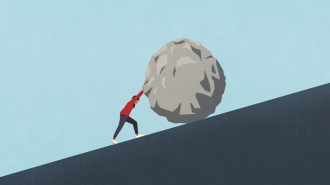Humans
Music keeps the mind sharp, plus chimp self-recognition, bullying's bodily effects and more in this week's news
First-person memorable
Those who speak first remember best — at least according to their comrades. In three experiments, participants who had watched videotaped events heard differing versions of the incidents from two others. Volunteers believed the first speaker more than the second and more often agreed with the first speaker’s account even if they knew that the observers spoke in random order, say psychologists Daniel Wright and Marianna Carlucci of Florida International University in Miami. People often collaborate in groups to remember events and may rightly assume that the first one to voice a memory tends to be accurate, the researchers will propose in
Psychonomic Bulletin and Review
. —
Bruce Bower
Happy tunes for aging brains
Musical experience and thinking skills go together among older adults. Mental faculties stay sharper after age 60 among people who have played a musical instrument for at least 10 years, compared with nonmusicians, say neuropsychologist Brenda Hanna-Pladdy of Emory University Medical Center in Atlanta and psychologist Alicia MacKay of the University of Kansas Medical Center in Kansas City. In a study to appear in
Neuropsychology
, experienced amateur musicians between ages 60 and 83 scored particularly well on tests of, object naming, flexible problem solving and memory for drawings. It’s not known whether musical training causes brain changes that aid older people’s thinking. —
Bruce Bower
Controversial heroin study
Monthly injections of a drug that blocks opiate activity in the brain show promise as a treatment for recovering heroin addicts, a controversial study to appear in
Lancet
finds. Russian heroin addicts stayed off the drug longer and avoided relapse more often when zapped with the opiate blocker than with a placebo, says a team led by psychiatrist Evgeny Krupitsky of Russia’s St. Petersburg Bekhterev Research Psychoneurological Institute. A group of researchers argues in the same issue of the journal that recent approval of this opiate blocker by the U.S. Food and Drug Administration for heroin treatment, based solely on Krupitsky’s data, is unjustified and might result in heroin overdoses once injections end. —
Bruce Bower
Bullying a stress hormone
Frequent bullying blunts children’s bodily response to stress, especially among those victimized most often and severely. Among pairs of identical male twins tracked from ages 5 to 12, bullied boys secreted lower amounts of a stress hormone called cortisol than their nonbullied brothers did shortly after performing several demanding tasks such as public speaking, says a team led by psychologist Louise Arseneault of King’s College London. Youngsters’ genetic makeup and family environments can’t account for cortisol disparities between bullied and nonbullied twins, the researchers report in an upcoming Journal of the
American Academy of Child and Adolescent Psychiatry
. —
Bruce Bower
Self-possessed chimps
In a new twist on a contentious issue, researchers say that chimpanzees display a key mental building block of self-recognition. Three apes living at a research facility can distinguish between events that they cause and those outside their control, say graduate student Takaaki Kaneko and psychologist Masaki Tomonaga, both of Kyoto University in Japan. Each chimp manipulated a cursor on a computer screen by using a trackball, while another cursor moved on its own. Chimps identified the cursor they controlled, the researchers report in an upcoming
Proceedings of the Royal Society B
, and showed signs of comparing trackball movements to the extent and timing of position changes observed for both cursors. —
Bruce Bower







